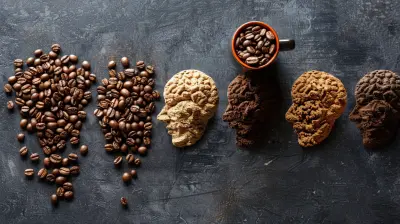The Hidden Role of Gut Health in Chronic Fatigue
3 January 2025
Ever wondered why you feel utterly exhausted, despite getting a solid eight hours of sleep? Or why that cup of coffee you rely on every morning doesn’t seem to fix your relentless fatigue? Chronic fatigue is a condition that plagues millions of people around the world, zapping their energy and leaving them feeling wiped out on a daily basis. While you might think your sleep habits, diet, or stress levels are solely to blame, there’s a sneaky culprit that doesn’t get enough attention—your gut. Yup, you read that right. Your gut health might be playing a much bigger role in your chronic fatigue than you ever imagined.
In this article, we’re diving deep into the fascinating connection between gut health and chronic fatigue. By the end, you’ll have a clearer understanding of why your stomach might just be the unexpected key to reclaiming your energy!
What Exactly Is Chronic Fatigue?
Before we can tackle the gut’s role, let’s get one thing straight: what is chronic fatigue? Chronic fatigue syndrome (CFS), or myalgic encephalomyelitis (ME), is more than just feeling tired after a long day. It’s a complex disorder characterized by extreme tiredness that doesn’t go away with rest. People with CFS often struggle with brain fog, muscle aches, and even difficulty performing everyday tasks.But here’s the kicker—it’s not just about being “lazy” or “unmotivated.” Chronic fatigue is a legitimate medical condition, and researchers are still trying to unravel what exactly causes it. While the roots of CFS are complex and multifaceted, one area of growing interest is the gut microbiome. 
The Gut: Your Body’s Second Brain
Let’s take a moment to appreciate how incredible your gut really is. It’s often called your “second brain” because of the way it communicates with your actual brain through the gut-brain axis. Your gut isn’t just about digesting food; it’s also home to trillions of bacteria that influence everything from your immune system to your mood.Think of your gut microbiome like a bustling city—there are good bacteria (the helpful citizens) and bad bacteria (the troublemakers). When everything’s in balance, your gut thrives, and so do you. But when the bad bacteria start to outnumber the good ones, chaos ensues, leading to a state called dysbiosis.
Dysbiosis can wreak havoc on your body in ways that you might never link to your gut, including—you guessed it—chronic fatigue. 
The Gut-Fatigue Connection
1. Inflammation: The Energy Thief
Did you know your gut plays a huge role in regulating inflammation in your body? When your gut is out of balance, it can trigger chronic low-grade inflammation, which is like having a constant fire smoldering in your body.This inflammation doesn’t just make you feel crummy—it also zaps your energy. Your body has to work overtime to fight off this invisible “fire,” leaving you feeling drained. Chronic inflammation has been closely linked to fatigue, and researchers now believe it’s one of the key players in conditions like CFS.
2. Leaky Gut Syndrome: The Unwanted Gatekeeper
Ever heard of leaky gut syndrome? Picture your gut as a finely woven net that only lets certain particles through. When the gut lining is healthy, it keeps harmful substances like toxins and undigested food out of your bloodstream. But when this lining is damaged—thanks to factors like stress, antibiotics, or a poor diet—it becomes more like a torn fishing net. This allows unwanted particles to sneak into your bloodstream, triggering an immune response.The immune system, thinking it’s under attack, ramps up inflammation, causing more fatigue. It’s a vicious cycle, and it all starts in the gut.
3. The Microbiome-Immune System Link
Your gut microbiome is like the control center for your immune system. About 70% of your immune cells live in your gut! When your microbiome is healthy, it sends the right signals to your immune system, keeping it in check. But when it's out of whack, your immune system can go haywire, leading to chronic fatigue.
How Your Gut Affects Your Energy Levels
You might be wondering, “Okay, but how does my gut influence how tired I feel?” Great question! Let’s break it down:- Nutrient Absorption: Your gut is responsible for absorbing the nutrients your body needs to produce energy, like B vitamins and magnesium. If your gut isn’t functioning properly, you might not be absorbing these nutrients as effectively, leaving you low on fuel.
- Hormone Production: Your gut bacteria also help produce hormones like serotonin and dopamine, which regulate mood and energy levels. When your gut is out of balance, these hormone levels can plummet, leaving you feeling sluggish.
- Toxin Overload: An unhealthy gut can struggle to filter out toxins efficiently. These toxins can accumulate in your body, leaving you feeling fatigued and foggy.
Signs Your Gut Needs Help
So how do you know if your gut is contributing to your fatigue? Here are some common signs that your gut might be out of balance:- Frequent bloating, gas, or indigestion
- Food sensitivities or allergies
- Mood swings, anxiety, or depression
- Skin issues like acne or eczema
- Trouble concentrating or "brain fog"
- Recurrent infections or a weak immune system
If you’re nodding along to several of these, it might be time to give your gut some TLC.
Practical Tips for Improving Gut Health
Let’s cut to the chase—you want to feel better, and that starts with taking care of your gut. Here are some simple yet effective ways to support your gut health:1. Eat More Fiber
Fiber is like a buffet for the good bacteria in your gut. Load up on fruits, veggies, whole grains, nuts, and seeds to keep your gut bacteria happy and healthy.2. Incorporate Probiotics and Prebiotics
Probiotics are the live bacteria that replenish your gut, while prebiotics are the foods that feed them. Think yogurt, kombucha, sauerkraut (probiotics), and garlic, onions, or bananas (prebiotics).3. Cut Back on Sugar and Processed Foods
Sugar and processed foods fuel the bad bacteria in your gut, throwing your microbiome out of balance. Stick to whole, nutrient-rich foods instead.4. Manage Stress
Stress doesn’t just mess with your mind—it also messes with your gut. Practice stress-reducing activities like yoga, meditation, or even just taking a walk in nature.5. Stay Hydrated
Water helps your digestive system function smoothly. Aim for at least 8 glasses a day to keep things flowing.6. Consider Supplements
In some cases, gut supplements like digestive enzymes or glutamine might be helpful. But always consult a healthcare professional before starting any new supplements.When to Seek Professional Help
If you’ve tried improving your gut health but still feel like you’re dragging through life, it might be time to consult a doctor or nutritionist. Chronic fatigue can have many root causes, and a professional can help identify what’s really going on.Wrapping It Up
Your gut is so much more than just a digestive organ—it’s a powerhouse that influences your energy, mood, and overall well-being. If chronic fatigue has been pulling you down, it’s worth taking a closer look at your gut health. By making small changes to your diet and lifestyle, you might just find the energy boost you’ve been longing for.So, ready to treat your gut like the VIP it is? After all, when your gut is happy, the rest of you will be too.
all images in this post were generated using AI tools
Category:
Gut HealthAuthor:

Angelo McGillivray
Discussion
rate this article
12 comments
Melody King
Absolutely loved this article! It's fascinating how our gut health can ripple through our energy levels. I’ve definitely noticed a difference since focusing on my diet—who knew our bellies held the key to vitality?
March 23, 2025 at 5:15 AM

Angelo McGillivray
Thank you! I'm so glad you enjoyed the article and found the connection between gut health and energy levels intriguing! Your experience highlights the importance of diet in overall vitality.
Leslie McKenzie
Gut health significantly influences overall well-being, affecting energy levels and fatigue. By nurturing our microbiome through a balanced diet, probiotics, and mindful eating, we can unlock new pathways to vitality. Understanding this connection may empower those struggling with chronic fatigue to reclaim their energy.
February 10, 2025 at 3:29 AM

Angelo McGillivray
Absolutely! Prioritizing gut health can be a key strategy in managing chronic fatigue, as a balanced microbiome supports energy and overall vitality.
Aleta Baxter
Gut health profoundly impacts energy levels; addressing it could unveil solutions for chronic fatigue.
February 3, 2025 at 4:46 PM

Angelo McGillivray
Thank you for your insight! Indeed, optimizing gut health can play a crucial role in enhancing energy levels and combating chronic fatigue.
Tiffany McDaniel
Understanding gut health is crucial for addressing chronic fatigue, as imbalances can significantly impact energy levels and overall well-being.
January 27, 2025 at 8:48 AM

Angelo McGillivray
Thank you for highlighting the vital link between gut health and energy levels! It's essential to recognize how imbalances can affect our overall well-being and contribute to chronic fatigue.
Reid Hensley
This article highlights the often overlooked connection between gut health and chronic fatigue. It’s crucial to consider how nutrition and gut balance can significantly impact energy levels and overall well-being.
January 22, 2025 at 3:27 AM

Angelo McGillivray
Thank you for your insightful comment! I agree—understanding the gut's impact on energy levels is key to addressing chronic fatigue.
Zachary McDaniel
This article beautifully highlights the vital connection between gut health and chronic fatigue. Understanding this relationship empowers us to take actionable steps towards improving our well-being. Thank you for sharing!
January 15, 2025 at 5:23 AM

Angelo McGillivray
Thank you for your kind words! I'm glad you found the connection between gut health and chronic fatigue insightful. Your engagement means a lot!
Eleanor Mason
Great insights on the connection between gut health and chronic fatigue! Exploring dietary changes and probiotics could be beneficial. It’s crucial to consider holistic approaches for managing energy levels effectively.
January 9, 2025 at 5:59 AM

Angelo McGillivray
Thank you! I completely agree—holistic approaches and dietary adjustments can play a significant role in improving gut health and energy levels. Your insights are valuable!
Maribel McLaughlin
Gut health significantly impacts energy levels; optimizing digestion can be a vital step in managing chronic fatigue effectively.
January 7, 2025 at 5:06 PM

Angelo McGillivray
Absolutely, optimizing gut health is crucial for boosting energy and effectively managing chronic fatigue. Thank you for highlighting this important connection!
Cypher Kearns
Understanding the connection between gut health and chronic fatigue can be a transformative journey. You're not alone in this struggle.
January 7, 2025 at 3:53 AM

Angelo McGillivray
Thank you for your thoughtful comment! It's true that gut health plays a crucial role in chronic fatigue, and recognizing this connection can be a key step towards healing. You're definitely not alone on this journey!
Franklin Walker
Turns out my gut is the real MVP! No wonder I’m tired—it's been throwing more parties than I have energy to attend!
January 4, 2025 at 5:23 PM

Angelo McGillivray
Thanks for sharing! Your gut definitely plays a crucial role in energy levels—it's amazing how much it impacts our overall health.
Zeke McAdams
Exploring the link between gut health and chronic fatigue is crucial for holistic wellness. Simple dietary changes, like increasing fiber and probiotics, can enhance gut microbiome balance, potentially alleviating fatigue. Prioritizing gut health may be a key step toward revitalizing your energy levels.
January 4, 2025 at 4:30 AM

Angelo McGillivray
Thank you for your insightful comment! I completely agree that improving gut health through dietary changes can play a significant role in managing chronic fatigue. It's a vital area for holistic wellness.
Brigitte Blevins
Thank you for shedding light on this important connection; gut health truly deserves more attention in wellness.
January 3, 2025 at 3:58 PM

Angelo McGillivray
Thank you for your thoughtful comment! I'm glad you found the connection important—gut health is indeed crucial for overall wellness.
MORE POSTS

Quiet the Mind: Techniques to Reduce Mental Overload

How to Choose the Right Moisturizer for Your Skin Type

Coffee and Brain Health: Myths vs. Facts

Exploring the Gluten-Free Options in Global Cuisines

The Impact of Stress on Chronic Pain: Coping Strategies

Simple and Delicious Recipes for a Gluten-Free Lifestyle

Sunscreen for Dark Skin Tones: Common Misconceptions and Best Practices

Strategies for Eating Gluten-Free During the Holidays